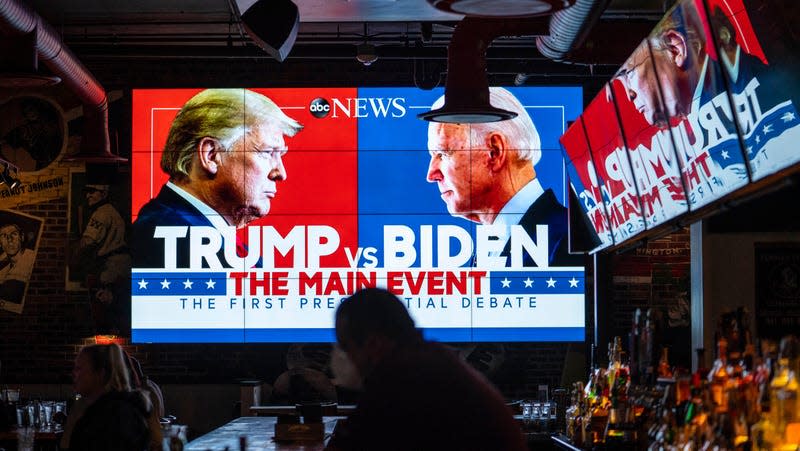Is the U.S. Ready for Election Betting? We're About to Find Out

Why bet on the 2022 World Series when you could bet on the 2022 midterms?
That’s the general mindset behind a group of well connected entrepreneurs and moneymakers, including one former Obama White House economist, who are vying to make betting on elections legal in the United States. If successful, the practice would build off surging interest in gambling in recent years, driven in part by the legalization and regulation of online sports betting platforms. At the same time, critics and consumer advocacy groups fear betting on politics could have dangerous downstream consequences for, ya know, democracy and all that.
Read more
Politico highlighted recent efforts to convince the Commodity Futures Trading Commission to agree to a new proposal from a prediction market operator called Kalshi which would allow bets on the upcoming midterm elections. The Kalshi proposal reportedly has backing from major financial industry players including Sacramento Kings co-owner Vivek Ranadivé, and former White House economist Jason Furman, who presumably see the potential to grow some green in the next battle between red and blue.
And they’re serious too. Kalshi’s reportedly preparing to sue the CFTC if they don’t grant approval for the bets. The CFTC reportedly talked over the proposal behind closed doors this week.
The CFTC doesn’t approve of gambling per se, which is why they’ve previously opposed efforts to create a FanDuel’s equivalent for politics. Instead, the CFTC oversees the sale of commodity and financial futures options which, as Politico notes, includes exchanges for energy and agricultural products. The main issue the CFTC’s trying to resolve is whether or not political events (A.K.A election betting) constitutes an illegal form of gaming or if they are more closely tied to say, pork futures. Of course, a reasonable person might ask what the fundamental difference between buying energy futures and Apple stock is from gambling, but that’s apparently beyond the scope of the CFTC’s reasoning.
The Kalshi proposal reportedly has the backing of a former CFTC acting chair and several former CFTC general counsels.
“Responsible innovation may make some people uncomfortable, but that’s not the basis for failing to follow the law and regulations,” former CFTC official Jeff Bandman, told Politico.
In addition to the pretty clear positive financial possibilities of election betting, supporters of the change, like Furman from the Obama White House, say prediction markets serving betters are in the public interest because they can potentially provide a more accurate window into elections than traditional sources. Furman claimed prediction makers have sometimes had better track records than traditional polling.
“They’re [prediction markets] a much purer way for people in business, government and interested parties to understand what might happen,” Furman told Politico.
Betting on U.S. elections isn’t available for Americans, but that doesn’t mean it isn’t already happening elsewhere. In 2020, well over $1 billion was reportedly spent by gamblers outside the U.S. on the presidential election between Joe Biden and Donald Trump. International gamblers’ interest in U.S. elections appear to be on the rise as well. In 2020, Matthew Shaddick, head of British gambling firm GVC told AFP the gambling market for the most recent presidential election was nearly twice as large as it was in the 2016 contest. During that same election cycle, a British gambler reportedly placed a $5 million bet, a world record for political bets, on Donald Trump, according to The New York Post.
Politics does arguably lend itself towards betting. Like sports, political campaigns and news analyses have become inundated with statistics, models, projections, and even power rankings. Just as a baseball fan might linger on ESPN a few minutes to hear Big Papi phone in some post-game commentary, CNN viewers can similarly stick around after a ballot count to hear Wolf Blitzer’s cutting, incisive takes. Both mediums are filled with rabid fans, predictable schedules, nail biting surprises, a fair share of scandals, and, apparently, viking-inspired costumes. So, if politics increasingly looks, smells, and acts like sports, then what’s the problem with making a few bucks off of it?
Well, consumer advocacy groups like D.C. based group Better Markets told Politico they fear political betting could make elections a new vehicle for day trading and said it could risk further undermining already weakening public trust in election results. If that point wasn’t already crystal clear, new polling this week from NBC News found just 22% of registered Republicans believe Joe Biden legitimately won the 2020 election nearly two years after the fact. It’s hard to see how opening elections up to the free market betting frenzies would make any of those statistics better. Better Markets CEO Dennis Kelleher told Politico he’s considering filing a lawsuit if the CFTC gives into the Kalshi proposal.
PredictIt, which technically calls itself an academic research experiment out of Victoria University of Wellington in New Zealand, was one of the very few platforms that let American users bet on U.S. election results thanks to a rare permission it was granted back in 2014. Bets on PredictIt were capped at $850, but that didn’t keep it from becoming a source of fascination for gamblers. According to New York Magazine, the site currently boasts 177,000 users, a figure which shot up following the 2016 presidential election. However back in August, the CFTC filed a motion revoking the letter PredictIt relied on to operate, meaning it will lose its legal authority to operate in the U.S.
More from Gizmodo
The Best Shortcuts On Mac: Snap Windows, Text to Speech, and More
How to Delete Your Twitter Account If Elon Musk Was Your Last Straw
Sign up for Gizmodo's Newsletter. For the latest news, Facebook, Twitter and Instagram.

 generic
generic 